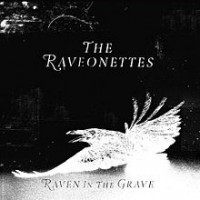
The Raveonettes
Raven in the Grave (2011)
Joe Pelone
Those who have really been paying attention will say that the Raveonettes have never truly made the same album twice. Sure, the Danish duo of Sune Rose Wagner and Sharin Foo have always dealt in quasi-gothic Jesus and Mary Chain-style noise pop. But each album has been an experiment. Chain Gang of Love was written in the same key. Pretty in Black toyed with '50s garage rock and '60s girl groups. Lust Lust Lust was really, really loud. In and Out of Control was the group's most overtly pop record.
Wagner and Foo have consistently dropped a new record every two years since 2003, and each time out they tweak their sound. Their latest, Raven in the Grave is their most ethereal album yet. The band has always dabbled in shoegaze, but Raven really earns the tag, recalling My Bloody Valentine's Loveless and the Cure's Disintegration at their most swirling and delicate.
Coming off of Lust and Control, then, Raven is another random switch-up, as it is neither as heavy nor as catchy as previous outings. Yet it's still just as beguiling. At nine songs in 35 minutes, the record is a brief, hypnotic burst of ambient noise pop. It's exactly what Raveonettes fans want while still subverting expectations.
"Recharge & Revolt", the longest song at five-and-a-half minutes, is both the opening track and the lead single. The Raveonettes' strength lies in turning uncommercial ideas–in this case lengthy, droning songwriting–into gold. "Recharge" isn't an obvious choice for a single (the vox don't kick in until nearly the two-minute mark, a big radio no-no), yet it's perfect. The drums plod on while Wagner strums and sings in his nasal, alien voice. A second guitar line and synths lay down a shoegaze dirge. It envelops the listener, segueing into "War in Heaven" effortlessly.
The songs cover the usual Raveonettes topics–death, sex, breaking up–but that's not the point. Raven creates a headspace of dark ambience, but it's also tightly constructed. Lust Lust Lust got a little overbearing; Raven's songs aren't too repetitious at all. It's harder to single out songs here than on Control, but that's because the record creates an overall mood of dreaminess. The Raveonettes have stayed faithful to a certain template for a decade now, but it's one that's flexible enough to encompass all the detours the group has gone on along the way.